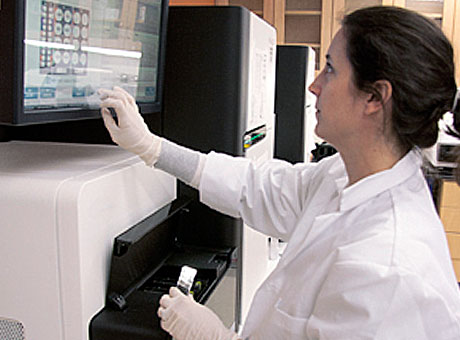
Research technician Maggie O'Guinn prepares a DNA sequencer.

Research technician Maggie O'Guinn prepares a DNA sequencer.
Rare genetic diseases, long overlooked because they affect relatively few people, are getting new attention. School of Medicine scientists are reaching out to patient advocacy groups and offering to decode the DNA of 99 patients with rare diseases to help find the genetic alterations responsible for their illnesses.
The patients’ DNA will be sequenced at the university’s Genomics and Pathology Services (GPS) at no cost to patients or the advocacy groups. The new effort is known as the Rare99X Clinical Exome Challenge.
“The genomics revolution provides many of the tools that may unlock the secrets of rare diseases,” says Jimmy Lin, PhD, research instructor in pathology and immunology and founder of the Rare Genomics Institute. “We are excited to form partnerships with patient advocacy groups to apply these technologies to advance clinical understanding of these diseases.”
An estimated 7,000 rare diseases affect some 25 million Americans. They range from Huntington’s disease, a neurodegenerative disorder diagnosed in adulthood, to Neimann-Pick, a metabolic disorder which can occur in infancy.
By early last year, exome sequencing had helped researchers identify genetic causes for 39 rare diseases. Scientists think this is only the beginning.
Many rare diseases are thought to be caused by genetic variations in the small portion of the DNA that codes for proteins, collectively known as the exome. This is the part of the DNA that will be sequenced.
By early last year, exome sequencing had helped researchers identify genetic causes for 39 rare diseases. Scientists think this is only the beginning.
“Identifying and validating gene alterations linked to disease is enabled by the advent of new sequencing methods that allow for highly sensitive analysis of the patient’s genetic makeup,” says Karen Seibert, PhD, director of GPS and research professor of pathology and immunology.
In addition to providing exome sequencing for rare disorders, Seibert notes that Genomics and Pathology Services also offers clinical genetic tests for patients with more common diseases such as cancer or heart disease. Mutations underlying those diseases can help physicians determine the best treatment options for patients.